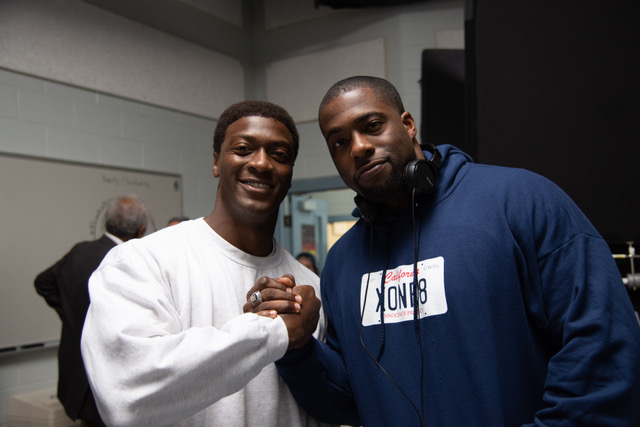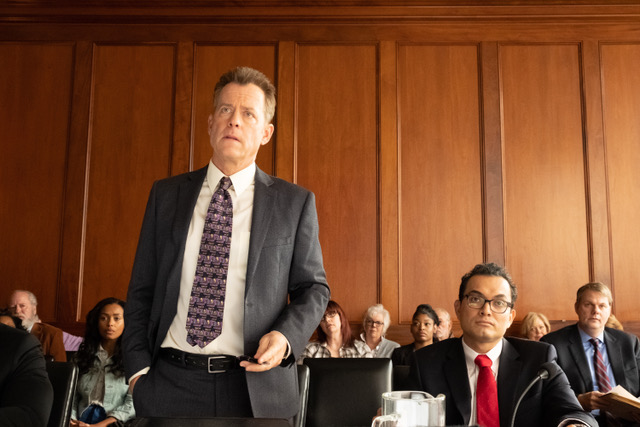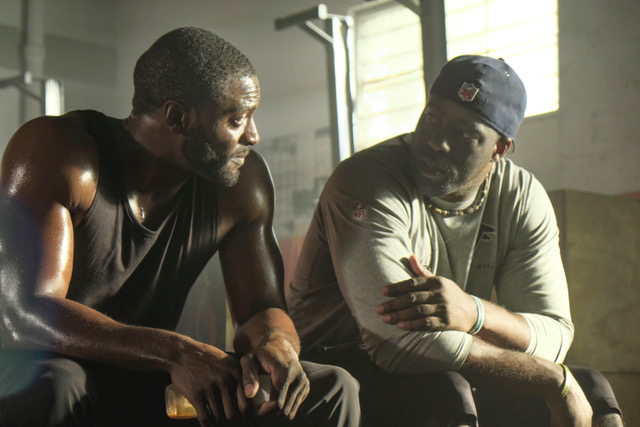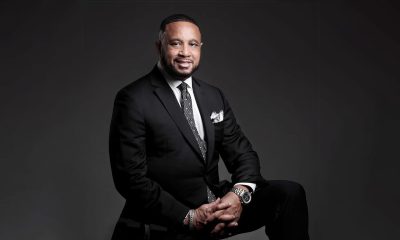#NNPA BlackPress
FILM REVIEW: Brian Banks
NNPA NEWSWIRE —Brian Banks’ story is a cautionary tale in an era when a false accusation can ruin a career. It shows that harm that can be done when well-intentioned advocates believe an accuser before hearing all the facts. Also, Banks’ predicament clearly indicates why parents should be in the room when their offspring are negotiating plea deals with public defenders. For a multitude of reasons, Banks’ experience should be shared.
By Dwight Brown NNPA Newswire Film Critic

In this #MeToo age, a biofilm about a wrongfully convicted high school football player, who was accused, tried and imprisoned for rape, is timely.

Actor Aldis Hodge (left) and the real life Brian Banks (right) on the set of Tom Shadyac’s BRIAN BANKS, a Bleecker Street release.
Credit: Katherine Bomboy / Bleecker Street
The real Brian Banks, the subject of this movie, lived through an ordeal that was tragic, inspiring and often profound, something is lost in this one-dimensional retelling of his life experiences. Something turns his extraordinary story of resilience into a decent but ordinary made-for-TV-like movie.
In 2002, Brian Banks (Aldis Hodge, Straight Outta Compton, Hidden Figures) is a junior at Polytechnic High School in Long Beach, California and a linebacker football player. He has verbally committed to attending USC based on his football prowess. The future looks bright for him and his single mom Leomia (Sherri Shepherd). One day at school, Banks runs into coed Kinnesha Rice (Xosha Roquemore), and they decide to hook up in a secluded school building where kids go to make out and get down.

Aldis Hodge stars as Brian Banks in Tom Shadyac’s BRIAN BANKS, a Bleecker Street release.
Credit: Katherine Bomboy / Bleecker Street
While in their secret place, Brian has a change of heart, leaves Kinnesha behind and she is forced to explain to a security guard why she is in a notorious spot. Flustered, the student fabricates a story about being raped. Her lie leads to Banks’ arrest, a too-hasty plea deal, trial, imprisonment, a tough parole and a sex offender label that haunts him.
Banks can’t live, work or be near places that children gather—including schools, parks and malls. He’s lost any academic or professional football opportunities. Unless his conviction is overturned, his future is bleak and he’s hit a wall.

Greg Kinnear stars as Justin Brooks in Tom Shadyac’s BRIAN BANKS, a Bleecker Street release.
Credit: Katherine Bomboy / Bleecker Street
That’s a galvanizing setup. Sympathetic protagonist, wrongly accused, innocent and determined yet filled with self-doubt. He’s the David. A California judicial system that rarely—if ever—overturns cases against convicts is the Goliath. Audiences like to watch a “good fight” against injustice. Bring it on.
Screenwriter Doug Atchison (Akeelah and the Bee) fit all the characters and pieces of Banks jumbled life into an easy-to-decipher script. Maybe too easy. Son, mom, accuser, mentors. The California Innocence Project (CIP) is also in the mix. It’s a non-profit that helps wrongfully convicted prisoners and is headed by Justin Brooks (Greg Kinnear). Other supporting characters (new girlfriend, skeptical prosecutor, accuser’s stubborn mom) augment the cast. But the focus is on Banks—his sorrow, integrity, courageousness and perseverance.
Given a story that sells itself, and a quest that provides innate momentum, you’d think filmmaker Tom Shadyac (The Nutty Professor) would have an easy time directing a film that’s powered by its own natural thrust. Yet, his plodding direction slows things down. The footage (Ricardo Diaz, cinematographer) is bland, lacks style and eye-catching composition.
Shadyac fails to get the cast’s emotions to rise to a level of desperation that piques attention. Everything seems average. Smart, intuitive directors (e.g. Sidney Lumet “Q & A,”) find ways to lift urban dramas off the page and turn them into compelling films that are more than the sum of their parts. Not the case here.

Aldis Hodge and Sherri Shepherd co-star in the Brian Bankcs biolfilm.
Can’t blame the editing (Greg Hayden, Zoolander), art direction (Starlet Jacobs), production design (Teresa Mastropierro) or costumes (Amanda Ford) for the general malaise. The tech credits are just decent enough to make this film semi-engaging for 99 minutes. The ensemble cast is proficient, but none stand out, except the lead.
Big question: “Why is Aldis Hodge in a so-so movie like this?” His deft interpretation of the character, the raw emotion he displays and the solid screen persona he creates crown his performance. He saves the film. At this point in his career, Hodges should be starring in far bigger projects than this. He should be one of the Avengers, vying for parts Denzel Washington has aged out of and up for roles that lead to Oscars. He’s that good.
Brian Banks’ story is a cautionary tale in an era when a false accusation can ruin a career. It shows that harm that can be done when well-intentioned advocates believe an accuser before hearing all the facts. Also, Banks’ predicament clearly indicates why parents should be in the room when their offspring are negotiating plea deals with public defenders. For a multitude of reasons, Banks’ experience should be shared.
The Brian Banks film, within the confines of its made-for-TV-movie-of-the-week approach, is not as three-dimensional as Banks real-life story. It lacks the artistry of an indie film, the dramatic chops of a cable film (HBO) and the repeat-viewing power necessary for a streaming movie (Netflix).
If this well-meant film has a saving grace, besides its message of resilience, its Hodges’ powerful performance. He’s an Oscar-caliber actor in need of an Oscar-caliber film.
Visit NNPA Newswire Film Critic Dwight Brown at DwightBrownInk.com and BlackPressUSA.com.
#NNPA BlackPress
A Nation in Freefall While the Powerful Feast: Trump Calls Affordability a ‘Con Job’
BLACKPRESSUSA NEWSWIRE — There are seasons in this country when the struggle of ordinary Americans is not merely a condition but a kind of weather that settles over everything.

By Stacy M. Brown
Black Press USA Senior National Correspondent
There are seasons in this country when the struggle of ordinary Americans is not merely a condition but a kind of weather that settles over everything. It enters the grocery aisle, the overdue bill, the rent notice, and the long nights spent calculating how to get through the next week. The latest numbers show that this season has not passed. It has deepened.
Private employers cut 32,000 jobs in November, according to ADP. Because the nation has been hemorrhaging jobs since President Trump took office, the administration has halted publishing the traditional monthly report. The ADP report revealed that small businesses suffered the heaviest losses. Establishments with fewer than 50 workers shed 120,000 positions, including 74,000 from companies with 20 to 49 workers. Larger firms added 90,000 jobs, widening the split between those rising and those falling.
Meanwhile, wealth continues to climb for the few who already possess most of it. Federal Reserve data shows the top 1 percent now holds $52 trillion. The top 10 percent added $5 trillion in the second quarter alone. The bottom half gained only 6 percent over the past year, a number so small it fades beside the towering fortunes above it.
“Less educated and poorer people tend to make worse mistakes,” John Campbell said to CBS News, while noting that the complexity of the system leaves many families lost before they even begin. Campbell, a Harvard University economist and coauthor of a book examining the country’s broken personal finance structure, pointed to a system built to confuse and punish those who lack time, training, or access.
“Creditors are just breathing down their necks,” Carol Fox told Bloomberg News, while noting that rising borrowing costs, shrinking consumer spending, and trade battles under the current administration have left owners desperate. Fox serves as a court-appointed Subchapter V trustee in Southern Florida and has watched the crisis unfold case by case.
During a cabinet meeting on Tuesday, Trump told those present that affordability “doesn’t mean anything to anybody.” He added that Democrats created a “con job” to mislead the public.
However, more than $30 million in taxpayer funds reportedly have supported his golf travel. Reports show Kristi Noem and FBI Director Kash Patel have also made extensive use of private jets through government and political networks. The administration approved a $40 billion bailout of Argentina. The president’s wealthy donors recently gathered for a dinner celebrating his planned $300 million White House ballroom.
During an appearance on CNBC, Mark Zandi, an economist, warned that the country could face serious economic threats. “We have learned that people make many mistakes,” Campbell added. “And particularly, sadly, less educated and poorer people tend to make worse mistakes.”
#NNPA BlackPress
The Numbers Behind the Myth of the Hundred Million Dollar Contract
BLACKPRESSUSA NEWSWIRE — Odell Beckham Jr. did not spark controversy on purpose. He sat on The Pivot Podcast and tried to explain the math behind a deal that looks limitless from the outside but shrinks fast once the system takes its cut.

By Stacy M. Brown
Black Press USA Senior National Correspondent
Odell Beckham Jr. did not spark controversy on purpose. He sat on The Pivot Podcast and tried to explain the math behind a deal that looks limitless from the outside but shrinks fast once the system takes its cut. He looked into the camera and tried to offer a truth most fans never hear. “You give somebody a five-year $100 million contract, right? What is it really? It is five years for sixty. You are getting taxed. Do the math. That is twelve million a year that you have to spend, use, save, invest, flaunt,” said Beckham. He added that buying a car, buying his mother a house, and covering the costs of life all chip away at what people assume lasts forever.
The reaction was instant. Many heard entitlement. Many heard a millionaire complaining. What they missed was a glimpse into a professional world built on big numbers up front and a quiet erasing of those numbers behind the scenes.
The tax data in Beckham’s world is not speculation. SmartAsset’s research shows that top NFL players often lose close to half their income to federal taxes, state taxes, and local taxes. The analysis explains that athletes in California face a state rate of 13.3 percent and that players are also taxed in every state where they play road games, a structure widely known as the jock tax. For many players, that means filing up to ten separate returns and facing a combined tax burden that reaches or exceeds 50 percent.
A look across the league paints the same picture. The research lists star players in New York, Philadelphia, Chicago, Detroit, and Cleveland, all giving up between 43 and 47 percent of their football income before they ever touch a dollar. Star quarterback Phillip Rivers, at one point, was projected to lose half of his playing income to taxes alone.
A second financial breakdown from MGO CPA shows that the problem does not only affect the highest earners. A $1 million salary falls to about $529,000 after federal taxes, state and city taxes, an agent fee, and a contract deduction. According to that analysis, professional athletes typically take home around half of their contract value, and that is before rent, meals, training, travel, and support obligations are counted.
The structure of professional sports contracts adds another layer. A study of major deals across MLB, the NBA, and the NFL notes that long-term agreements lose value over time because the dollar today has more power than the dollar paid in the future. Even the largest deals shrink once adjusted for time. The study explains that contract size alone does not guarantee financial success and that structure and timing play a crucial role in a player’s long-term outcomes.
Beckham has also faced headlines claiming he is “on the brink of bankruptcy despite earning over one hundred million” in his career. Those reports repeated his statement that “after taxes, it is only sixty million” and captured the disbelief from fans who could not understand how money at that level could ever tighten.
Other reactions lacked nuance. One article wrote that no one could relate to any struggle on eight million dollars a year. Another described his approach as “the definition of a new-money move” and argued that it signaled poor financial choices and inflated spending.
But the underlying truth reaches far beyond Beckham. Professional athletes enter sudden wealth without preparation. They carry the weight of family support. They navigate teams, agents, advisors, and expectations from every direction. Their earning window is brief. Their career can end in a moment. Their income is fragmented, taxed, and carved up before the public ever sees the real number.
The math is unflinching. Twenty million dollars becomes something closer to $8 million after federal taxes, state taxes, jock taxes, agent fees, training costs, and family responsibilities. Over five years, that is about $40 million of real, spendable income. It is transformative money, but not infinite. Not guaranteed. Not protected.
Beckham offered a question at the heart of this entire debate. “Can you make that last forever?”
#NNPA BlackPress
FBI Report Warns of Fear, Paralysis, And Political Turmoil Under Director Kash Patel
BLACKPRESSUSA NEWSWIRE — Six months into Kash Patel’s tenure as Director of the Federal Bureau of Investigation, a newly compiled internal report from a national alliance of retired and active-duty FBI agents and analysts delivers a stark warning about what the Bureau has become under his leadership.

Six months into Kash Patel’s tenure as Director of the Federal Bureau of Investigation, a newly compiled internal report from a national alliance of retired and active-duty FBI agents and analysts delivers a stark warning about what the Bureau has become under his leadership. The 115-page document, submitted to Congress this month, is built entirely on verified reporting from inside field offices across the country and paints a picture of an agency gripped by fear, divided by ideology, and drifting without direction.
The report’s authors write that they launched their inquiry after receiving troubling accounts from inside the Bureau only four months into Patel’s tenure. They describe their goal as a pulse check on whether the ninth FBI director was reforming the Bureau or destabilizing it. Their conclusion: the preliminary findings were discouraging.
Reports Describe Widespread Internal Distrust and Open Hostility Toward President Trump
Sources across the country told investigators that a large number of FBI employees openly express hostility toward President Donald Trump. One source reported seeing an “increasing number of FBI Special Agents who dislike the President,” adding that these employees were exhibiting what they called “TDS” and had lost “their ability to think critically about an issue and distinguish fact from fiction.” Another source described employees making off-color comments about the administration during office conversations.
The sentiment reportedly extends beyond domestic lines. Law enforcement and intelligence partners in allied countries have privately expressed fear that the Trump administration could damage long-term international cooperation according to a sub-source who reported those concerns directly to investigators.
Pardon Backlash and Fear of Retaliation
The President’s January 20 pardons of individuals convicted for their roles in the January 6 attack ignited what the report calls demoralization inside the Bureau. One FBI employee said they were “demoralized” that individuals “rightfully convicted” were pardoned and feared that some of those individuals or their supporters might target them or their family for carrying out their duties. Another source described widespread anger that lists of personnel who worked on January 6 investigations had been provided to the Justice Department for review, noting that agents “were just following orders” and now worry those lists could leak publicly.
Morale In Decline
Morale among FBI employees appears to be sinking fast. There were a few scattered positive notes, but the weight of the reporting describes morale as low, bad, or terrible. Agents with more than a decade of service told investigators they feel marginalized or ignored. Some are counting the days until they can retire. One even uses a countdown app on their phone.
Culture Of Fear
Layered over that unhappiness is something far more corrosive. A culture of fear. Sources say Patel, though personable, created mistrust from the start because of harsh remarks he made about the FBI before taking office. Agents took those comments personally. They now work in an atmosphere where employees keep their heads down and speak carefully. Managers wait for directions because they are afraid a wrong move could cost them their jobs. One source said agents dread coming to work because nobody knows who will be reassigned or fired next.
Leadership Concerns
The report also paints a picture of leaders unprepared for the jobs they hold. Multiple sources said Patel is in over his head and lacks the breadth of experience required to understand the Bureau’s complex programs. Some said Deputy Director Dan Bongino should never have been appointed because the role requires deep institutional knowledge of FBI operations. A sub-source recounted Bongino telling employees during a field office visit that “the truth is for chumps.” Employees who heard it were stunned and offended.
Social Media and Communication Breakdowns
Communication inside the Bureau has become another source of frustration. Sources said Patel and Bongino spend too much time posting on social media and not enough time communicating with employees in clear and official ways. Several told investigators they learn more about FBI operations from tweets than from internal channels.
ICE Assignments Raise Alarm
Nothing has sparked more frustration inside the FBI than the orders requiring agents to assist Immigration and Customs Enforcement. The reporting shows widespread resentment and fear over these assignments. Agents say they have little training in immigration law and were ordered into operations without proper planning. Some said they were put in tactically unsafe positions. They also warned that being pulled away from counterterrorism and counterintelligence investigations threatens national security. One sub-source asked, “If we’re not working CT and CI, then who is?”
DEI Program Removal
Even the future of diversity programs became a point of division. Some agents praised Patel’s removal of DEI initiatives. Others said the old system left them afraid to speak honestly because they worried about being labeled racist. The reporting shows a deep and unresolved conflict over whether DEI strengthened the organization or weakened it.
Notable Incidents
The document also details several incidents that have become part of FBI lore. Patel ordered all employees to remove pronouns and personal messages from their email signatures yet used the number nine in his own. Agents laughed at what they saw as hypocrisy. In another episode, FBI employees who discussed Patel’s request for an FBI-issued firearm were ordered to take polygraph examinations, which one respected source described as punitive. And in Utah, Patel refused to exit a plane without a medium-sized FBI raid jacket. A team scrambled to find one and finally secured a female agent’s jacket. Patel still refused to step out until patches were added. SWAT members removed patches from their own uniforms to satisfy the demand.
A Bureau at a Crossroad
The Alliance warns that the Bureau stands at a difficult crossroads. They write that the FBI faces some of the most daunting challenges in its history. But even in despair, a few voices say something different. One veteran source said “It is early, but most can see the mission is now the priority. Case work and threats are the focus again. Reform is headed in the right direction.”
-

 Activism4 weeks ago
Activism4 weeks agoDesmond Gumbs — Visionary Founder, Mentor, and Builder of Opportunity
-

 Activism4 weeks ago
Activism4 weeks agoFamilies Across the U.S. Are Facing an ‘Affordability Crisis,’ Says United Way Bay Area
-

 Alameda County4 weeks ago
Alameda County4 weeks agoOakland Council Expands Citywide Security Cameras Despite Major Opposition
-

 Alameda County4 weeks ago
Alameda County4 weeks agoBling It On: Holiday Lights Brighten Dark Nights All Around the Bay
-

 Activism4 weeks ago
Activism4 weeks agoOakland Post: Week of December 17 – 23, 2025
-

 Activism4 weeks ago
Activism4 weeks agoBlack Arts Movement Business District Named New Cultural District in California
-

 Activism4 weeks ago
Activism4 weeks agoLu Lu’s House is Not Just Toying Around with the Community
-

 Activism1 week ago
Activism1 week agoOP-ED: AB 1349 Puts Corporate Power Over Community

















































